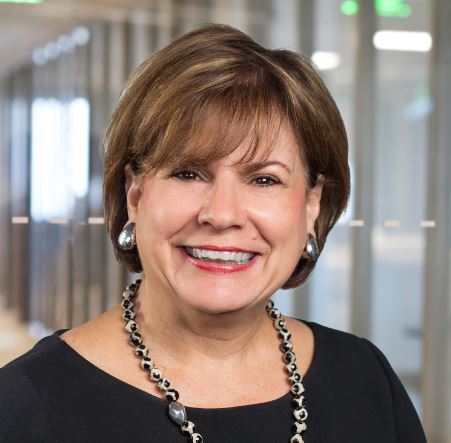Treatable mutations, obesity-driven cancer and clinical trial access are among local speakers’ topics for this year’s symposium.
Researchers from the Mays Cancer Center, home to UT Health San Antonio MD Anderson Cancer Center, will present results of multiple lines of study Dec. 7-10 during the 2021 San Antonio Breast Cancer Symposium (SABCS). The international symposium, initiated and owned by the Mays Cancer Center and operated in conjunction with the American Association for Cancer Research, is again at the Henry B. Gonzalez Convention Center and will include both in-person and virtual attendance.
SABCS Co-Director Virginia Kaklamani, MD, DSc, leader of the breast oncology program at the Mays Cancer Center and professor of medicine at UT Health San Antonio, will present a project titled “Mutational landscape and immune infiltration of breast cancer metastases to gynecologic and other organs.”

“This is a study of breast cancer patients to assess changes that occur between the time they are diagnosed with early stage disease and the time they are diagnosed with metastatic disease,” Dr. Kaklamani said. “It shows that many genetic mutations take place, many of which can be targeted with drugs we already have at our disposal.”
Dr. Kaklamani occupies two endowed chairs at UT Health San Antonio: the Ruth McLean Bowman Bowers Chair in Breast Cancer Research and Treatment, and the A.B. Alexander Distinguished Chair in Oncology.
Phase I clinical trial
Recently the Mays Cancer Center was a participating site in a first-in-humans phase I trial of a new breast cancer medication. Results will be presented at the SABCS. “We have been heavily involved with the development of the drug,” Dr. Kaklamani said. “This is a novel endocrine therapy that has shown to improve patient outcomes, and we look forward to the FDA [U.S. Food and Drug Administration] evaluating the drug.”
Obesity and triple-negative breast cancer
Suryavathi Viswanadhpalli, PhD, assistant professor of obstetrics and gynecology, will present the project “Leukemia inhibitory factor receptor (LIFR) inhibition reduces obesity-driven progression of triple-negative breast cancer.”
Obese women have increased risk of recurrence and death from triple-negative breast cancer (TNBC). “We found that obesity upregulates pro-cancer signaling of LIFR in TNBC,” Dr. Viswanadhpalli said. “Alternatively, inhibiting LIFR blocks obesity-driven disease progression. Results further suggest that LIFR inhibitor EC359 could be used as a new therapeutic agent to treat obesity-associated TNBC.”
Inhibiting enzyme to block tumor growth
 Henriette Balinda, PhD, research scientist at the Mays Cancer Center, will present the study, “Inhibition of FASN as a potential treatment of advanced therapy-resistant breast cancer.”
Henriette Balinda, PhD, research scientist at the Mays Cancer Center, will present the study, “Inhibition of FASN as a potential treatment of advanced therapy-resistant breast cancer.”
Approximately 75% of breast cancers are estrogen receptor-positive, making endocrine therapy an important treatment for breast cancer. However, this is not a cure, as many patients develop resistance to the treatment and succumb to their disease.
“In our laboratory, we investigated the effects of inhibiting fatty acid synthase (FASN), a key enzyme in lipid metabolism in endocrine therapy-resistant breast tumors,” Dr. Balinda said. “We found that FASN inhibition blocks proliferation and tumor growth of these therapy-resistant breast cancers.”
Understanding and reducing treatment disparities
Gail Tomlinson, MD, PhD, professor of pediatrics at UT Health San Antonio who occupies the Greehey Distinguished Chair in Genetics and Cancer, will present a project titled “Increased rates of genetic variants of unknown significance in Latino and African American populations of South Texas.”
This project, funded through the Cancer Prevention & Research Institute of Texas (CPRIT), involved clinical outreach to areas of South Texas to evaluate individuals and families for cancer predisposition. “An interesting finding was that genetic ‘variants of unknown significance,’ for which a genetic test result could not be definitively interpreted, were nearly twice as frequent in individuals of Hispanic background, and more than three times as frequent in African Americans, reflecting a significant disparity in population genomic knowledge of these minority groups,” Dr. Tomlinson said.
Recruiting Latinos into clinical trials

Amelie Ramirez, DrPH, associate director of cancer outreach and engagement at the Mays Cancer Center, will speak on “Increasing accrual of Latinos into clinical trials: A cancer center’s perspective.”
Latinos represent 18.5% of the U.S. population but account for less than 10% of those in federal cancer and drug studies. “The largely Latino region of South Texas faces many barriers to clinical trial participation, from a lack of knowledge or understanding of trials, to social determinants of health that make it harder for them to participate (health care coverage, transportation, language, cultural issues, discrimination, etc.),” Dr. Ramirez said. “As a result, South Texas Latinos suffer many health disparities, including higher rates of liver, stomach, cervical and gallbladder cancers.”
The Mays Cancer Center has taken multiple steps to engage more Latinos in clinical cancer research. The effort includes a new program to create Latino-focused recruitment strategies and systems for clinical trials in cancer treatment. Another initiative focuses on improving patient-provider communication and trust. The cancer center has already increased the percentage of clinical trial participants who are Latino, Dr. Ramirez said.
Dr. Ramirez is professor and chair of population health sciences at UT Health San Antonio and director of the Institute for Health Promotion Research. She occupies the Dielmann Chair in Health Disparities Research and Community Outreach and the Max and Minnie Tomerlin Voelcker Endowed Chair in Cancer Healthcare.
In the news:
KSAT 12: One of the largest breast cancer symposiums in the world is coming to San Antonio this week
Fox San Antonio: San Antonio’s Breast Cancer Symposium continues
KENS 5: San Antonio Breast Cancer Symposium happening now | Wear the Gown


